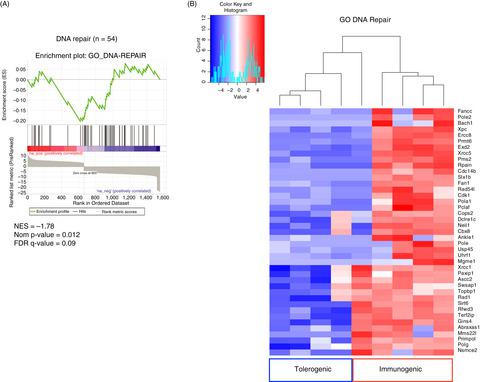当前位置:
X-MOL 学术
›
Immunology
›
论文详情
Our official English website, www.x-mol.net, welcomes your
feedback! (Note: you will need to create a separate account there.)
Tolerance induction in memory CD4 T cells is partial and reversible.
Immunology ( IF 4.9 ) Pub Date : 2020-09-15 , DOI: 10.1111/imm.13263 Joshua I Gray 1 , Shaima Al-Khabouri 1 , Fraser Morton 1 , Eric T Clambey 2 , Laurent Gapin 3 , Jennifer L Matsuda 3 , John W Kappler 3 , Philippa Marrack 3 , Paul Garside 1 , Thomas D Otto 1 , Megan K L MacLeod 1
Immunology ( IF 4.9 ) Pub Date : 2020-09-15 , DOI: 10.1111/imm.13263 Joshua I Gray 1 , Shaima Al-Khabouri 1 , Fraser Morton 1 , Eric T Clambey 2 , Laurent Gapin 3 , Jennifer L Matsuda 3 , John W Kappler 3 , Philippa Marrack 3 , Paul Garside 1 , Thomas D Otto 1 , Megan K L MacLeod 1
Affiliation

|
Memory T cells respond rapidly in part because they are less reliant on a heightened levels of costimulatory molecules. This enables rapid control of secondary infecting pathogens but presents challenges to efforts to control or silence memory CD4 T cells, for example in antigen‐specific tolerance strategies for autoimmunity. We have examined the transcriptional and functional consequences of reactivating memory CD4 T cells in the absence of an adjuvant. We find that memory CD4 T cells generated by infection or immunisation survive secondary activation with antigen delivered without adjuvant, regardless of their location in secondary lymphoid organs or peripheral tissues. These cells were, however, functionally altered following a tertiary immunisation with antigen and adjuvant, proliferating poorly but maintaining their ability to produce inflammatory cytokines. Transcriptional and cell cycle analysis of these memory CD4 T cells suggests they are unable to commit fully to cell division potentially because of low expression of DNA repair enzymes. In contrast, these memory CD4 T cells could proliferate following tertiary reactivation by viral re‐infection. These data indicate that antigen‐specific tolerogenic strategies must examine multiple parameters of Tcell function, and provide insight into the molecular mechanisms that may lead to deletional tolerance of memory CD4 T cells.
中文翻译:

记忆 CD4 T 细胞的耐受诱导是部分可逆的。
记忆 T 细胞反应迅速,部分原因是它们不太依赖高水平的共刺激分子。这使得能够快速控制继发感染病原体,但对控制或沉默记忆 CD4 T 细胞的努力提出了挑战,例如在自身免疫的抗原特异性耐受策略中。我们已经检查了在没有佐剂的情况下重新激活记忆 CD4 T 细胞的转录和功能后果。我们发现由感染或免疫产生的记忆 CD4 T 细胞在没有佐剂的情况下传递抗原的二次活化中存活,无论它们在次级淋巴器官或外周组织中的位置如何。然而,在用抗原和佐剂进行三次免疫后,这些细胞的功能发生了改变,增殖不佳,但仍能保持产生炎性细胞因子的能力。这些记忆 CD4 T 细胞的转录和细胞周期分析表明,由于 DNA 修复酶的低表达,它们可能无法完全进行细胞分裂。相比之下,这些记忆 CD4 T 细胞可以在病毒再感染的三级再激活后增殖。这些数据表明,抗原特异性致耐受策略必须检查 T 细胞功能的多个参数,并深入了解可能导致记忆 CD4 T 细胞缺失耐受的分子机制。这些记忆 CD4 T 细胞可以在病毒再感染的三级再激活后增殖。这些数据表明,抗原特异性致耐受策略必须检查 T 细胞功能的多个参数,并深入了解可能导致记忆 CD4 T 细胞缺失耐受的分子机制。这些记忆 CD4 T 细胞可以在病毒再感染的三级再激活后增殖。这些数据表明,抗原特异性致耐受策略必须检查 T 细胞功能的多个参数,并深入了解可能导致记忆 CD4 T 细胞缺失耐受的分子机制。
更新日期:2020-09-15
中文翻译:

记忆 CD4 T 细胞的耐受诱导是部分可逆的。
记忆 T 细胞反应迅速,部分原因是它们不太依赖高水平的共刺激分子。这使得能够快速控制继发感染病原体,但对控制或沉默记忆 CD4 T 细胞的努力提出了挑战,例如在自身免疫的抗原特异性耐受策略中。我们已经检查了在没有佐剂的情况下重新激活记忆 CD4 T 细胞的转录和功能后果。我们发现由感染或免疫产生的记忆 CD4 T 细胞在没有佐剂的情况下传递抗原的二次活化中存活,无论它们在次级淋巴器官或外周组织中的位置如何。然而,在用抗原和佐剂进行三次免疫后,这些细胞的功能发生了改变,增殖不佳,但仍能保持产生炎性细胞因子的能力。这些记忆 CD4 T 细胞的转录和细胞周期分析表明,由于 DNA 修复酶的低表达,它们可能无法完全进行细胞分裂。相比之下,这些记忆 CD4 T 细胞可以在病毒再感染的三级再激活后增殖。这些数据表明,抗原特异性致耐受策略必须检查 T 细胞功能的多个参数,并深入了解可能导致记忆 CD4 T 细胞缺失耐受的分子机制。这些记忆 CD4 T 细胞可以在病毒再感染的三级再激活后增殖。这些数据表明,抗原特异性致耐受策略必须检查 T 细胞功能的多个参数,并深入了解可能导致记忆 CD4 T 细胞缺失耐受的分子机制。这些记忆 CD4 T 细胞可以在病毒再感染的三级再激活后增殖。这些数据表明,抗原特异性致耐受策略必须检查 T 细胞功能的多个参数,并深入了解可能导致记忆 CD4 T 细胞缺失耐受的分子机制。











































 京公网安备 11010802027423号
京公网安备 11010802027423号